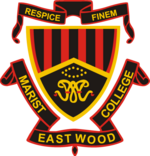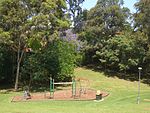Brush Farm
1794 establishments in AustraliaCommunity buildings in New South WalesEastwood, New South WalesEvent venues in New South WalesFarms in New South Wales ... and 6 more
Homesteads in New South WalesHouses completed in 1894Houses in SydneyNew South Wales State Heritage RegisterTourist attractions in New South WalesUse Australian English from June 2018

Brush Farm is a heritage-listed former farm, residence and vineyard and now tourist attraction, community facility, exhibition venue and meeting venue at Marsden Road, Eastwood of the City of Ryde local government area of New South Wales, Australia. It was built from 1794 to 1894. It is also known as Home for Boys, Eastwood Home for Mothers and Babies and Brush Farm Home for Mentally Deficient Children, and Brush Farm Girls' Home. The property is owned by City of Ryde. It was added to the New South Wales State Heritage Register on 2 April 1999.
Excerpt from the Wikipedia article Brush Farm (License: CC BY-SA 3.0, Authors, Images).Brush Farm
Terry Road, Sydney Eastwood
Geographical coordinates (GPS) Address Nearby Places Show on map
Geographical coordinates (GPS)
| Latitude | Longitude |
|---|---|
| N -33.7931 ° | E 151.0668 ° |
Address
Terry Road
2122 Sydney, Eastwood
New South Wales, Australia
Open on Google Maps











